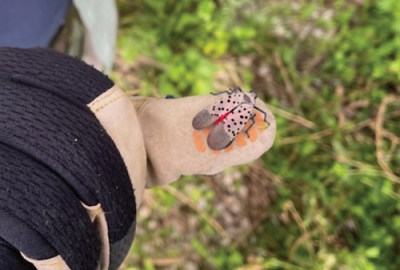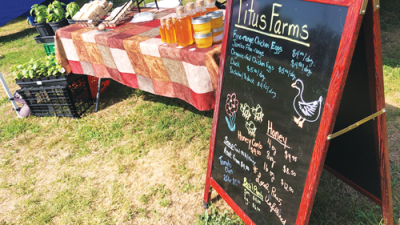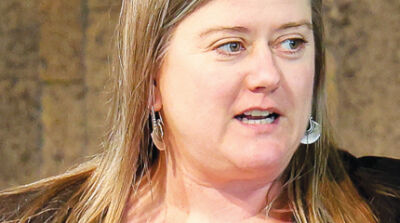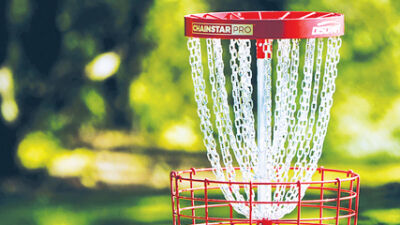
Amanda Ruffini will be presenting “Integrated Pest Management and Invasive Species” at 10 a.m. May 3 at the Burgess-Shadbush Nature Center, 4101 River Bends Drive in Shelby Township.
Photo provided by Marietta Crabtree
SHELBY TOWNSHIP — The Southern Michigan Daylily Society will be hosting a free program called “Integrated Pest Management and Invasive Species” at 10 a.m. May 3 at the Burgess-Shadbush Nature Center, 4101 River Bends Drive in Shelby Township.
The event will be presented by Amanda Ruffini, director of the Lake St. Clair Cooperative Invasive Species Management Area. Ruffini is a University of Denver graduate with a master’s degree in natural resource management.
Gardeners will have an opportunity to learn about safer methods to control garden pests, including special needs in pollinator and organic gardens, and will also learn about how to deal with invasive species in home gardens and the natural environment.
Informational handouts will be available.
Ruffini said The Lake St. Clair CISMA was established in 2015.
“Our mission is to work collaboratively to enhance ecosystem functions and services through invasive species prevention, detection, management and outreach in Macomb and St. Clair Counties. My goal as the CISMA director is to prevent the spread of invasive species and provide the tools and methods to manage invasives. In my personal life, my goal is to protect and restore the land we have so that communities are able to experience and enjoy nature,” she said.
She said integrated pest management is a science-based approach to pest control that relies on a combination of management methods, including biological control, habitat manipulation and chemical control, to minimize economic impacts and risks to people, property and the environment.
“IPM is important because it is necessary for environmentally responsible pest control, as it helps to prevent initial pest problems, minimizes need for pesticides, reduces environmental impacts to human health and promotes a balanced ecosystem. For example, IPM positively impacts pollinators by reducing the use of pesticide, promoting biodiversity through native plantings or selecting pest resistant plants, and enhancing habitat. This contributes to pollinator health,” she said.
Invasive species are non-native plants — plants that are not historically found in Michigan, that could cause harm to health, the economy and the environment. Invasive species are directly linked to IPM, as both focus on minimizing environmental damage and human impacts while controlling pests or preventing their spread.
Ruffini will explain how the home gardener can use IPM, including methods of prevention and early detection, natural pest control, and implementation of control methods and monitoring.
“Local invasive species will be discussed including two recent invasives, the spotted lantern fly and beech tree leaf disease. The spotted lantern fly, native to Asia, feeds on more than 70 different plants including grapes, apples and hardwood trees causing damage by sucking sap from host plants. The beech leaf disease weakens beech trees and can lead to their death and is of concern for 370 million Michigan beech trees,” she said.
She said CISMA is currently assisting the Burgess-Shadbush Nature Center in Shelby Township with its pollinator habitat restoration project An area near the nature center building is being restored to a meadow with Michigan native plants for pollinators.
“CISMA has provided an invasive species management plan for the area, which has included removal of autumn olive bushes, phragmites and black swallow-wort,” she said.
Elizabeth Schultz, Burgess-Shadbush Nature Center coordinator. said integrated pest management and invasive species knowledge is important for all gardeners as a part of good earth stewardship.
“IPM and invasive species knowledge is essential for the management of gardens with pollinators for the protection of the bees, butterflies and other beneficial insects, since they are killed by insecticides. This program is a great opportunity to learn about integrated pest management and invasive species from Amanda Ruffini, a CISMA expert who is managing environmental projects in Macomb and St. Clair Counties,” Schultz said.
Ruffini will present an additional program with emphasis on fall season integrated management of garden pests and invasives on Oct. 4. For more information, visit lakestclaircisma.com.
For questions, contact Marietta Crabtree, vice president, Southern Michigan Daylily Society, at (586) 612-1848 or visit midaylilysociety.com.
All speaker programs with the Southern Michigan Daylily Society are held at the Burgess-Shadbush Nature Center, 4101 River Bends Drive in Shelby Township. Registration is required. Email marietta.crabtree@gmail.com or call (586) 612-1848.
 Publication select ▼
Publication select ▼


















